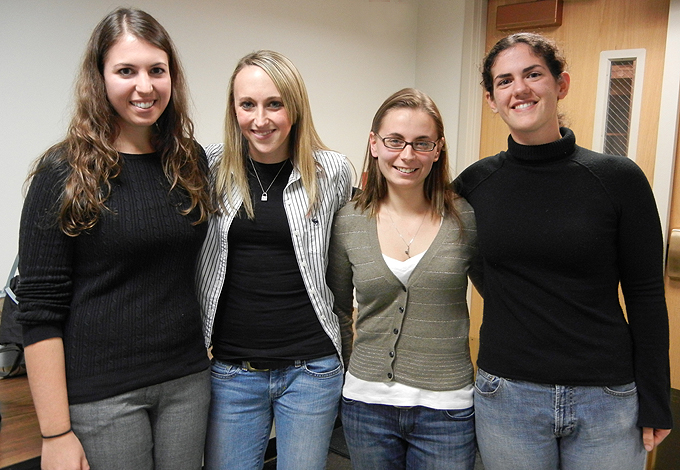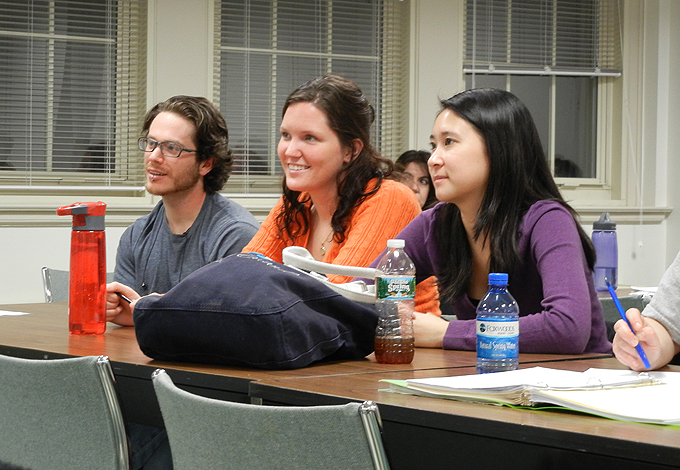
When Felicity Acca graduated from St. Joseph’s college in West Hartford in 2006, she knew she wanted a job in the science and technology industry. But when she began sending out her resume, she found that her biology major just wasn’t doing the trick.
“All the technology companies wanted people with more research experience,” she says. “I spent two years trying to find a job in my field.” Part of the reason, she says, is that there were few hands-on laboratory classes required for her undergraduate major.
So in 2008, Acca enrolled at UConn in a novel program of study that’s cropping up at colleges across the country. Called professional science master’s (PSM) degrees, these programs combine hands-on science experience with professional skill development and a full-time internship to prepare students for jobs in the technology industry.
Now, Acca and three other women from her graduating class are employed at the same biotechnology company. Along with Acca, graduates of the PSM program in applied genomics Maria Bonatsakis, Katie Johnson, and Erica Waltz make up about a fifth of the staff at the Branford, Conn. branch of Illumina Inc.
“It’s clear to me that this program is making a difference,” says Linda Strausbaugh, professor of genetics and genomics in the College of Liberal Arts and Sciences. “It’s the really valuable professional training that sets these students apart.”
Strausbaugh is head of UConn’s Center for Applied Genetics and Technology and oversees the professional science master’s program in applied genomics. The program was started in 2002, and all of its 56 alumni to date are employed or have moved on for further graduate study. The college also supports professional master’s degrees in applied financial mathematics and microbial systems analysis.
When the national PSM movement started just over a decade ago, Strausbaugh says, the idea was to give people an alternative to the Ph.D. track if they were interested in professional jobs in science, mathematics, and technology.
In addition to intensive on-campus research experience, such as weekend-long trainings on specific laboratory techniques, the UConn program includes a three-month internship at a local business. Waltz spent her internship working with Connecticut’s Forensic Science Laboratory in Meriden, where she validated and did quality control studies on DNA testing kits that are used in criminal cases throughout the state. She also wrote her master’s thesis on this work.
Johnson notes that the program teaches more than just research and laboratory techniques. “We also learned business skills, like professional communication, management, interviewing, and resume writing,” she says.
Adds Bonatsakis, “It gives you the edge you need to get a job.”
Bonatsakis was the first of the women to be hired by the company, then known as the technology start-up Affomix. The company is involved in proteomics – the study of how proteins express themselves in the body. Technology companies are interested in proteomics because in the future, this field may have biomedical implications in the same way that individualized medicine and genomics does today.
After only a few months on the job, Bonatsakis realized how well the UConn’s program had prepared her for the position.

When the company started to expand, they asked if she knew anyone like her, as they were so impressed with her resume and professionalism. So she contacted a few of her friends from the program, and it wasn’t long before Acca, Johnson, and Waltz were all interviewed by the company – within the same week – and subsequently hired.
The trend hasn’t stopped there. The four women recently visited a PSM class to relate their experience to current students, and they came with a request from their supervisors that students interested in the company should send along their resumes when they graduate.
In recent years, Connecticut has seen small technology start-ups popping up all over, increasing the technology job opportunities in the state. The fact that four UConn PSM students were hired by one Connecticut company, says Strausbaugh, speaks to the strengthening partnership between their program and the state.
“We’ve always been good for small businesses,” adds Strausbaugh. “Our graduates understand what it’s like to work for a company, and they have the scientific skills to match. I think these graduates can go anywhere they want to go.”


